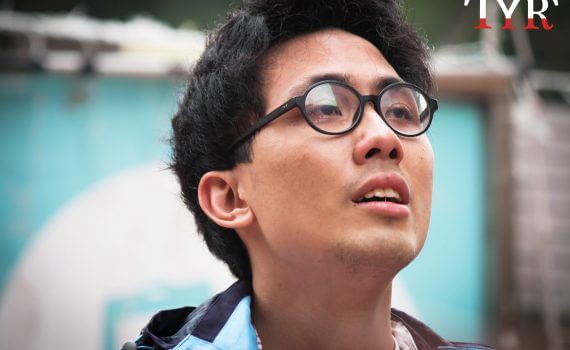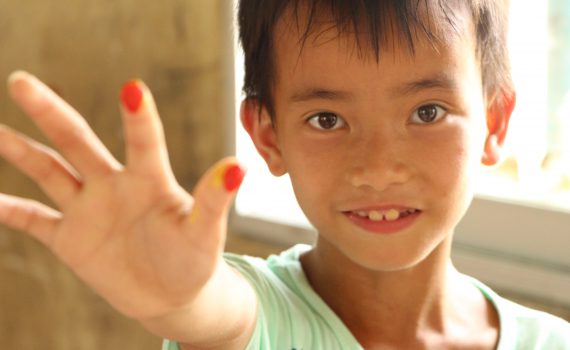Society

Hundreds protest against suspension of Baptist University student duo
- 2018-01-26
- Society
- The Young Reporter
- By: Elly Wu、Raphael Blet、Yoyo Chow、Katherine Li、Rob McGainEdited by: Angie Chan、Ezra Cheung、Michael Shum、Michelle Ng、Wing Li
- 2018-01-26
More than 200 people participated in a protest at Hong Kong Baptist University at 1.30 pm following the suspension of two students, according to the University's Students' Union. After being accused of threatening the staff and using abusive language during an eight-hour stand-off at the University's Language Centre, president of Hong Kong Baptist University Students' Union, Lau Tsz-kei, and a Chinese medicine student, Andrew Chan Lok-hang, were suspended pending disciplinary procedures. The University's decision to suspend the pair prompted mixed reactions with some praising the University's decision and others criticising the University for not awaiting the verdict of the disciplinary committee. A group of counter-protesters who were seen brandishing banners labelling the student union "a gang" and accused some professors of supporting the students. "We are proud of being Chinese citizens and right now, it's a Putonghua-speaking world," wrote a banner. Both parties could be seen hurling vulgarities at each other, but they were quickly separated by the security personnel. John Tse Wing-ling, former Legislative Councillor and Associate Professor of City University's Department of Applied Sciences, marched with the HKBU students in support for elimination to the compulsory Putonghua policy. "If Putonghua is really going to be a fixed standard, then this standard should also apply to all university staff members, including professors," he said, referring to the controversial requirement. Tse did not believe that a certain language should be a parameter of whether students could graduate. "If you judge everyone on the same standard, which is their Putonghua proficiency, then the Chief Executive of Macau won't even get his job," said Tse. The former lawmaker criticised the university for making the suspension of involved students public. "It's the first time in 30 years of teaching that I see a Vice-Chancellor announcing student suspension in front of the press," …

A rundown of the recent events regarding the Putonghua incident at HKBU
- 2018-01-25
- Society
- The Young Reporter
- By: Yoyo Chow、Michelle Ng、Holly ChikEdited by: Michael Shum、Angie Chan、Ezra Cheung
- 2018-01-25
Two students at Hong Kong Baptist University were suspended on Wednesday after "occupying" the Language Centre. The incident happened a week after the release of the results of the Putonghua exemption test, in which 70% of the students who took the test failed. About 30 students headed to the Language Centre and occupied the centre for eight hours. Students' Union president Lau Tsz-kei later admitted that he spoke a Cantonese swear word during the exchange with an official from the Language Centre. The University described in a mass email four days after the event that the language used by the student was "abusive" and that their behaviour was "hostile". According to the mass email to all students, staff and alumni, two students were suspended from school "based on evidence currently available" because they "have been found to have conducted themselves in a way that made our colleagues feel threatened and insulted." They have been suspended from attending classes and exams but allowed to set foot on the University's premises. The University also said "their actions had also affected the normal operation of the University and seriously violated the Student Standards of Conduct." What is the Putonghua graduation requirement? According to the Language Centre of Hong Kong Baptist University, it is stated that all "undergraduate students are required to reach foundation Putonghua proficiency before they graduate". They can either pass a 3-unit Putonghua course offered by the Language Centre or take a 25-hour non-credit bearing course and pass a Proficiency Test conducted by the Language Centre. To be exempted from the requirement, students have to meet one of the following criteria: Non-Chinese speaking students Attended the Chinese Language examination in the Mainland or Taiwan Have attained Grade C or above in the HKCEE Putonghua subject Have passed the Test of …

Children of asylum seekers deprived of education rights in Hong Kong
- 2017-12-30
- Society
- The Young Reporter
- By: Candice Wong、Erica ChinEdited by: Cecilia Wong
- 2017-12-30
Education expert and legislator call for conditional working rights of asylum seekers in supporting their own education expenses and daily expenses Isabella Ng Fung-sheung, assistant professor at The Education University of Hong Kong, volunteers at the Hong Kong Society for Asylum Seekers and Refugees. She said only one out of 170 asylum seekers can successfully make a non-refoulement claim so that they are not forced to leave the city. This process might take years, and their children may be deprived of their rights to education during the wait. Asylum seekers are not allowed to work in Hong Kong. Each person receives $1200 a month in food stamps from the government, which is enough for staple food but not much else, according to Dr. Ng. And while their children can go to school for free, Dr. Ng said asylum seekers often find it difficult to pay for school uniforms and books. Although most schools reimburse the parents for their expenses, they do have to pay upfront and then claim the money back with receipts. "Some families are not able to reach here for weekly gathering as they can't afford the transportation expenses," said Dr. Ng. Language barrier is also a major obstacle for young asylum seekers who desire education in Hong Kong, Dr. Ng stated. " The teacher kept telling me that this child cannot speak Chinese, can she understand at least one word of Chinese, if not, this child is so difficult to manage," said Dr. Ng when she recalled her experience in helping child asylum seekers searching for schools. " Local schools accept few non-Chinese speaking children," Dr. Ng says. " I tried to look for a kindergarten for a daughter of an asylum seeker once. She had a Hong Kong identity card, but eight out of ten schools …

Somewhere over the rainbow - How an 8-year-old boy experience China's education gulf
- 2017-12-30
- Society
- The Young Reporter
- By: Caroline KwokEdited by: Cecilia Wong
- 2017-12-30
Every morning at 8:30, the muddy ocher-coloured cottage is blasted with young voices reading aloud textbook passages, so loud that it can be heard across the cement-levelled playground far from the school gate. There are three classrooms in the cottage with no lights but a rickety ceiling fan each. Drawings are repeatedly glued on and ripped off a section of the wall framed with red rice paper. On top, it wrote sloppily "In Celebration of the June First International Children's Day". This is where the eight-year-old Huang Wei-biao goes to school every day with his 22 young schoolmates, a village in the rural area of the East Guangxi province. The nearest town is 45 minutes of serpentine car ride away. One can tell Huang is a diligent student as he reads his textbook with his finger precisely pointing at each word when he pronounces it. One can tell Huang is an assiduous child as the veins of his neck appear every time he utters a word. One can tell Huang is an eager learner as each page of his textbook is torn and curled at the corners. Yet no matter how earnest or smart a student Huang is, he is just one the 13.8 million village primary students in China who are probably receiving education of lower quality than students who study in the urban parts of China. Village schools lack facilities and professionally trained teachers. Pupils do not have classes in other areas such as arts and physical education, let alone school outings. In comparison, the XinXing primary school in the same prefectural city has a multi-story building with a sports ground. There are more than 40 teachers and most of them have received tertiary education. Children's' parents can also find better working opportunities close by and not have …

Food Order Platforms Price Markup Up to 86%
- 2017-12-08
- Society
- The Young Reporter
- By: Susan Gao、Melissa KO、Kenji ChanEdited by: Susan Gao
- 2017-12-08
More than 60% of the meals ordered through online food order platforms were more expensive than restaurants' takeaway, with price markup up to 86%, the Consumer Council said on Wednesday. After 91 trial purchases from nine food order platforms in September, the Council found problems including hidden surcharges, unilaterally order cancellation, late delivery, food leaking and double charges. The prices of over half of the food on four aggregate order platforms such as Foodpanda and UberEATS were about 30% higher than takeaway prices, while all the food on three eatery chain platforms including McDelivery were marked up by 4% to 86% with an average of 30%, said the Council. The Council's Chief Executive Gilly Wong Fung-han said at Wednesday's press conference that they would not advise on prices, and markup was understandable if people accepted paying more for convenience. Ho Chung-yin, a 32-year-old data analyst working in Central said she had used Foodpanda four times and knew the prices were much higher. "I only order online when I don't have time to eat out," she said. Testers of the Council found five out of 13 orders were canceled without remedy when ordering on 51WM, an aggregate platform. UberEATS even listed restaurants that had already folded or were being decorated without any notice, testers said. Customer Service Director of 51WM Dickson Lo told The Young Reporter that order cancellations were all done solely by restaurants, probably because they were understaffed or the locations were too far away. "We cannot improve the problem in the long run," Lo said, "because it is a fundamental problem resulting from restaurant's own uncertainties." The Council urged traders to be responsible and delineate every party's responsibility clearly, and provide means of contacts for inquiries with immediate assistance, while three aggregate platforms still have no contact hotline. …

Yahoo Asia Buzz Awards handed out to "buzziest" icons in 2017
- 2017-12-07
- Society
- The Young Reporter
- By: Wing LiEdited by: Jianne Soriano
- 2017-12-07
The 2017 Yahoo Asia Buzz Awards was held on December 7 2017 at the Hong Kong Cultural Center. Based on search results from Yahoo's search engine, the annual Buzz Awards rewards the "buzziest" icons in the Asia-Pacific region. The awards show this year featured appearances from popular Hong Kong celebrities like Vincent Wong, Chrissie Chau, Kara Wai and Natalie Tong. Some of the notable winners include Hacken Lee, who won the awards for the "Top Buzz Local Male Singer" and the "Top Searched Song of the Year." C AllStar, Dear Jane and Supper Moment also won the "Top Buzz Local Group" award. The main highlight and closing act of the show is K-pop star Samuel Kim, who received the award of the :Most Searched Korean New Singer." He also performed three songs and closed the event. Reported by Wing Li Edited by Jianne Soriano Photos by Jianne Soriano

Hong Kong Pride Parade 2017: Goodbye to LGBTI discrimination
- 2017-11-25
- Society
- The Young Reporter
- By: Li Wing Kiu、Elisa Luk、Japson Melanie Jane、Ezra CheungEdited by: Choy York Borg Paulus、Cecilia Wong、Daisy Lee
- 2017-11-25
The Pride Parade 2017 kicked off at two pm today, with hanging lucky scrolls in Victoria Park, signifying the smoothing out of the path, for people of all sexualities. The slogan for this year's parade is "turn the tide, walk with pride". Gary Fan Kwok-wai, current member of the Sai Kung District Council, believes that sexual minority rights should be legally protected. "Everyone should be equally treated, including sexual minorities," said Fan. Professor Alfred Chan, the chairperson of the Equal Opportunities Commission, said there will be legal consultations concerning transgender rights next year. Professor Chan said everyone, especially the government, should cooperate to achieve equality in society. "Everyone is born equal," said Kwok Ka-ki, member of the Legislative Council. However, Kwok thinks that the road to equality for the LGBTQI community is always not an easy one in Hong Kong.

Lifelong suffering of women in India
- 2017-10-25
- Society
- The Young Reporter
- By: Scout Xu、Maggie LiuEdited by: Lam Ka Sing
- 2017-10-25
Women in India suffer from violence throughout their lives, according to a veteran journalist covering the issue for years. The violence starts from infancy, from infanticide and infancy neglect to domestic violence, said Nita Bhalla, the chief correspondent in South Asia at the Thomson Reuters Foundation, in a forum of Hong Kong Baptist University today. Based in New Delhi, Nita Bhalla works as a foreign correspondent for about 20 years and wins an award for her coverage on human rights. Meanwhile, since females are often considered inferior to males, if a family can only support one child for education, the opportunity always goes to the male ones, resulting in deprived opportunities in education, said Bhalla. About half of Indian women get married under the age of 14, according to a government report, and the youngest was only aged 6, said Bhalla. After they get married, sexual abuse within the family, wife-sharing and domestic violence tend to follow, she said. Six out of ten men admitted they have committed domestic violence, including hitting their wives, confiscating their money and devaluing them, according to a United Nations report. At the end of her talk, she says because there are still many positive stories, she can recover from overwhelming frustrations after witnessing disasters. A famous case of brutality to females is the Delhi gang rape, in which a 23-year-old female student was raped by six men in a bus, resulting in her death and worldwide attention. Under social pressure invoked by the protests, four attackers were sentenced to death by the government, while one of them, who was under 18, was charged with a three-year sentence. "The death penalty can't solve the problem as we find in researches," said Bhalla. "Our main focus should on the change in mindset and how we regard …

Government plans to provide subsidies for university hostels construction
- 2017-10-11
- Society
- The Young Reporter
- By: Elly Wu、Elisa Luk、Erica Chin、Holly ChikEdited by: Angela Cheung、Daniel Ma
- 2017-10-11
Carrie Lam, the city's Chief Executive, announced in the latest Policy Address the setting up of a $12 billion Hostel Development Fund, offering subsidies for universities to construct student hostels. Lam said the lack of on-campus accommodations could hinder international students from studying in Hong Kong, thus making the local tertiary campuses and learning environment less international. Lam believed that establishing the development fund could speed up the executive procedures. The University of Hong Kong, which has the highest percentage of international students of 39% among all University Grants Committee(UGC) funded universities, accepted less than half of international students who applied for dormitories in the year 2014-2015. Meanwhile, all international students applied for hostels in Lingnan University were accepted. However, only 15% of applicants are international students, which is the lowest among local universities. Hence, the "internationalisation" of a university campus has no direct relationship to the provision of residential halls. The "internationalisation" of a university campus has no direct relationship to the provision of residential halls. "The policy would help to attract more international student only if they are prioritised to apply for on-campus accommodation," said Annie Chan, associate professor of Lingnan University. Kevin Yue, Resident Master of one of Hong Kong Baptist University's halls, pointed out that universities' policies on arranging residential hall units to local and international students affect the effectiveness bringing diversity to the campuses, especially when there is not enough dormitories even for local students. Less than half of the 63 international students studying in Hong Kong Baptist University reached by The Young Reporter said they would study in Hong Kong without a dormitory place Out of 63 international students reached, 48 percent of them claimed that they would come to Hong Kong to study even without a dormitory. "I would still come to Hong …

Carrie Lam pledges better political inclusion of ethnic minorities
- 2017-10-11
- Society
- The Young Reporter
- By: Tracy Zhang、Jade Li、Raphael BletEdited by: Choy York Borg Paulus、Tracy Zhang、Ellen He
- 2017-10-11
Requirements on Chinese proficiency will be relaxed to include more ethnic minorities in the government, announced Chief Executive Carrie Lam in her first policy address. "We need to increase the job opportunities for ethnic minorities to work in the government," said Lam. Civil Service Bureau has started a review on the entry requirements relating to Chinese proficiency to get more ethnic minorities working in the government. Currently, ethnic minorities willing to join the civil service are required to undergo a written Chinese proficiency test. The government launched Project Gemstone in 2013 to teach ethnic minority young people Chinese, making it easier for them to join the police. Apart from the support on language, representatives of ethnic minority have also been included in a preparatory committee chaired by Lam for children's issues. Shalini Mahtani, the founder of Zubin Foundation said it's a good start because at least Carrie Lam is looking into this issue. "We'll continue to ask Carrie Lam to get more ethnic minority members into government advisory committees to express their voices," she said. However, Pro-democracy lawmaker Claudia Mo said the policy address showed "complete ignorance" on long-lasting ethnic minority problems. "I feel pessimistic. We should keep on fighting and can see miracles on politics including ethnic minority's political participation in Hong Kong," said Mo. Abeer, spokesperson of HK Ethnic Minority Women, said the lack of political participation for ethnic minorities cannot be solved in a short time through those limited measurements. "Hong Kong is lagging behind in almost all aspects of life services for ethnic minorities," she said. "No doctors, no police officers, so even no need to mention politicians." Kathleen Magramo, a Filipino student from the University of Hong Kong said the framework is on the right track but concrete actors need to be mobilised to see …
